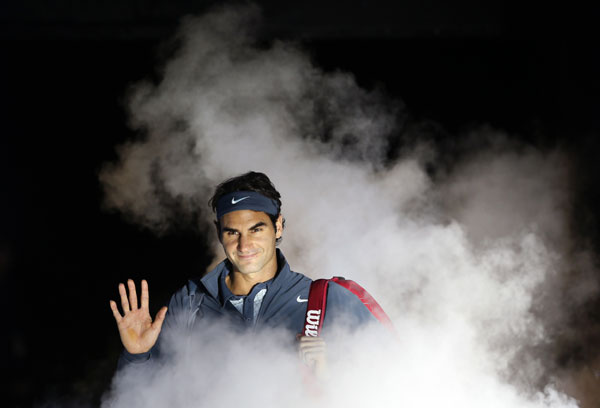

 |
|
Roger Federer of Switzerland arrives for his men's singles tennis match against Richard Gasquet of France at the ATP World Tour Finals at the O2 Arena in London, Nov 7, 2013. [Photo/Agencies] |
LONDON - In the wake of Novak Djokovic's attack against tennis' anti-doping program, Roger Federer defended the system and asked for more doping tests on Thursday.
Djokovic lashed out at the World Anti-Doping Agency and at tennis authorities this week, saying the decision in Victor Troicki's case proved the fight against doping was badly organized.
Troicki had an 18-month ban reduced on appeal to 12 months for skipping a blood test in April, though he provided a urine sample which proved negative. The Court of Arbitration for Sport empathized with Troicki but had to uphold a ban.
Asked about the case, Federer said at the ATP Finals he has faith in the system but the testing program should be reinforced because he feels "like we're not getting maybe tested enough."
In 2012, the ITF conducted 1,727 in competition urine samples but only 124 blood tests during tournaments. There were a total of 2,185 samples taken either in or out of competition, from urine and blood.
"I didn't get tested in Basel, I don't think. I didn't get tested in Paris, I don't think. I got tested here after the first match. I just feel like there needs to be more testing done," Federer said, recalling his recent tournaments.
"I know the budgets can be small sometimes, all these things. I had out-of-competition testing before Basel. I just feel like I used to get tested more, I felt. I think I was tested 25 times in 2003, 2004. Ever since, I think it's been clearly going down this season."
Last year, International Tennis Federation anti-doping manager Stuart Miller said in an interview with The Associated Press that the ITF tested Federer an average of eight times per year during 2004-06, 11 times per year during 2007-09 and nine times per year in 2010-12.
Troicki blamed a tournament anti-doping officer, who he claimed advised him to write to the ITF explaining that he was ill and could not give a blood sample.
"I do believe that when you are requested for a sample, you have to give the sample," Federer said. "It doesn't matter how bad you feel. I'm sorry. I think it's just very important to give the sample when you're requested to give it because there you are in front of them and there is no way to escape anymore. That's where we just need to be extremely firm, I believe."